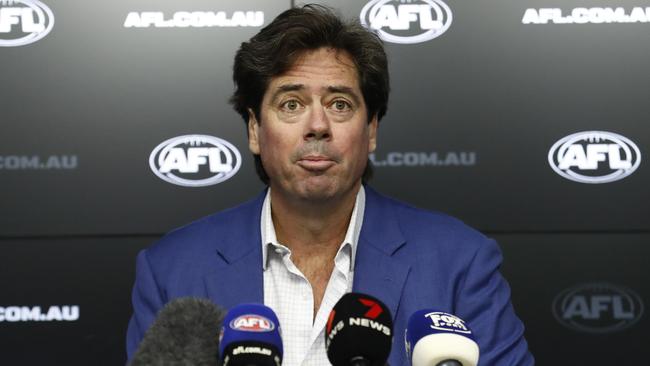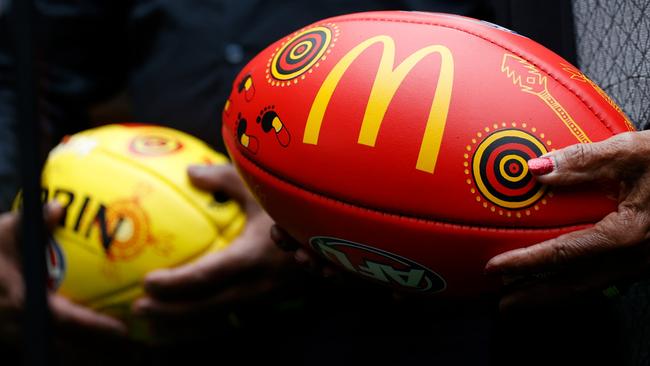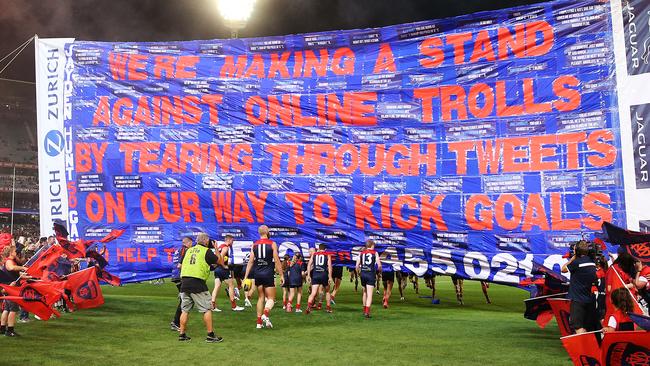AFL Players’ Association report: AFL and AFLW players are staying silent on human rights issues
AFL and AFLW players have ranked the biggest societal issues players face in a survey. But it was their answers on human rights issues and concussions issues that appear most surprising.
AFL
Don't miss out on the headlines from AFL. Followed categories will be added to My News.
Almost one in 10 AFL players said they hid a concussion last year while a broader “culture of silence” is preventing players from speaking their truths on human rights issues including racism, an AFLPA survey says.
The AFL Players’ Association’s Insight and Impact report has revealed male and female players often feel gagged by their own clubs.
“We’ve heard players talk about this off the back of Adelaide (pre-season camp) and Hawthorn (racism saga),” AFLPA boss Paul Marsh said on Monday night.
“I think the industry needs to be asking itself the question why players are not comfortable?
“Our view is there’s very strong team cultures, which is one of the great positives of AFL, but at the same time players feel as though they’re potentially hurting their team culture if they speak up on issues.
“We think it’s important the industry does make players feel comfortable. They have a right to speak out and it’s about safety and at times we’ve questioned whether aspects of our industry are safe.

“It’s a concern and it’s something we’re doing a bit of work on.
“We’re introducing a whistleblower service and this is something the industry needs to keep striving to improve because there has been a common theme in big issues in recent years.”
The rate of Indigenous and multicultural players experiencing racism while listed in the AFL has not changed – 32 per cent (men) and 30 per cent (women).
Fourteen per cent of respondents in the AFLPA survey reported that they had experienced racism in the past 12 months while 77 per cent of AFLW and 40 per cent of AFL Indigenous and multicultural players were not satisfied with how a racism incident was handled once it was reported.
Last year nine per cent of male players said they experienced a concussion that they didn’t report – surpassing the five-year average of seven per cent and returning to the levels in 2016-18.
Marsh said it was due to the mandatory 12-day sit-out period.
“Anecdotally what we’re hearing from players is a fear of missing out on matches,” he said.
“Obviously careers are tied to matches and payments are tied to matches – that’s what it is largely.
“It’s not a huge number, but it’s an alarming number in a sense that we’ve never had a better understanding of how serious the injury is.
“It’s something we’d like to see turned back the other way.”

Mental health and trolls on social media were the biggest two societal issues for players.
Players were asked to select up to three of the most significant issues facing players – with 73 per cent of men and women choosing mental health, followed by social media (56 per cent for women and 52 per cent for men).
The other main issues for female players were gender and sexuality inclusivity (54 per cent) and media scrutiny (51 per cent).
For males it was media scrutiny (45 per cent), racism (43 per cent) and gambling (26 per cent). Gambling was reported as a problem by just 1 per cent of female players.
Illicit drugs was selected by 19 per cent of men and 4 per cent of women as an issue.
AFLW mental health issues are led by anxiety (16 per cent) and depression (9 per cent) while ADHD has emerged as an issue for female players.

The AFLPA report reinforced the strong correlation between workplace culture and on-field success – the three AFL clubs with the highest workplace culture scores finished in last year’s top six.
Measures include time off, care, off-field development and support.
“The progression we have seen over 10 years in workplace culture scores really does talk to the value of us seeking player feedback and then constructively feeding it back to clubs,” Marsh said.
“The results speak for themselves. Clubs have improved their cultures and players feel more trusted, supported and cared for in these environments. This is a win for everyone.”
But the expectation for players to attend their club on their day off has soared from 2 per cent (2019) to 12 per cent (2022).




